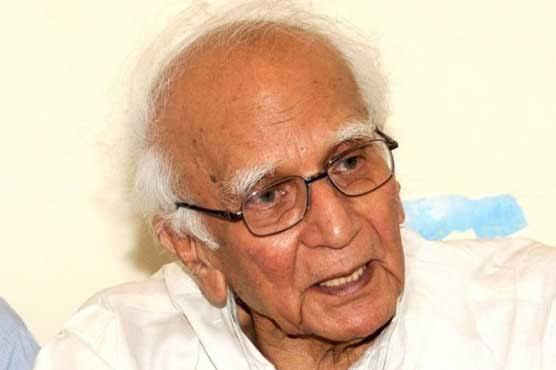
In December 2019, when I visited Dr Mubashir Hasan at his home in Lahore, I read out to him a Statement on India’s Citizenship (Amendment) Act, drafted by a friend in Kathmandu. Dr Saab readily endorsed it, probably his last public comment (see below). He is the first person who talked to me about pushing for a South Asian Union along the lines of the European Union. He passed away today, aged 98. A great mentor, leader, guide and friend. May he rest in peace. More later.
Statement on India’s Citizenship (Amendment) Act by 14 independent South Asian citizens
26 December 2019
We independent citizens of countries neighbouring India wish to register our reservations about the Citizenship (Amendment) Act adopted by India’s Parliament, which aims to provide Indian citizenship to non-Muslims who approach from three countries – Pakistan, Bangladesh and Afghanistan.
The Act is discriminatory at the first instance because it targets Muslims beyond the stated intent of the law. It is unacceptable for any country including one with a secular Constitution to distinguish between citizens, foreign or domestic, on the basis of religion. Further, the Act has the potential to deepen geopolitical divides among the countries of South Asia at a time when they should be striving for peace and mutual understanding.
We are further concerned that the announced India-wide National Register of Citizens, planned in one form or another as follow-up to the CAA, will make vulnerable tens of millions of people. As observers of India, we had not understood citizenship to be a major problem in the country when compared to so many other pressing issues of social justice. We fear that such a programme will have deadly fallout during implementation, particularly for the 200 million Muslims living under the umbrella of the secular Constitution.
The signatories believe that India’s plans for growth and equity will be hurt by ill-advised attempts at social engineering, which will in turn also impact the population of the larger South Asian region. A weakened, insular India will not be able to take a stand on urgent matters confronting humanity, such as nuclear weaponisation, the climate crisis, hi-tech surveillance or the contagion of pollution.
We question the logic of the Indian Government wanting to extend citizenship to Hindus, Jains, Christians and Sikhs when there are also larger numbers of Muslims of different sects enduring intolerance in the three selected countries. Among others, these include Ahmediya and Shia, particularly Hazara, of Pakistan, and Ahmediya of Bangladesh. The Tamil refugees of Sri Lanka in India as well as the Rohingya, of Myanmar and in Bangladesh refugee camps, are also vulnerable.
If the New Delhi authorities were seeking security for religious minorities in the three selected countries, they should have engaged in sustained diplomatic effort. We believe that, with its action, the Government of India has made religious minorities in the three countries more vulnerable than before.
The most logical approach for India is to join the 1951 UN Convention on Refugees, and to be open to foreigners of any faith or persuasion who seek refuge. Selecting non-citizens based on religion defies basic human values.
The rest of South Asia has long appreciated the spirit of inclusion and social justice that has marked modern India. We signatories of this statement are distressed by the decisive majoritarian turn in India as well as the intolerance evident in the ongoing crackdown on peaceful dissent.
A democratic, pluralist India that promotes solidarity, co-existence and mutual respect among diverse ethnic, religious and cultural communities within its borders is vital for a peaceful and stable South Asia as a whole.
Signatories:
- Arif Hasan, Karachi
- Beena Sarwar, Karachi
- Hameeda Hossain, Dhaka
- I.A. Rehman, Lahore
- Jayadeva Uyangoda, Colombo
- Kanak Mani Dixit, Lalitpur
- Mahesh Maskey, Kathmandu
- Mubashir Hasan, Lahore
- NayanTara Gurung Kakshapati, Lalitpur
- Pervez Hoodbhoy, Islamabad
- Pratyoush Onta, Lalitpur
- Serajul Islam Choudhury, Dhaka
- Shahidul Alam, Dhaka
- Sumathy Sivamohan, Peradeniya
See also: A nation losing democratic steam, by Kanak Mani Dixit, in The Hindu.
Filed under: Southasia | Tagged: CAA, CAB, Dr Mubashir Hasan, fascism, India, persecution, south asia, Southasia |


My heartfelt condolences. I was fortunate enough to have had the opportunity to interact with this great person on several occasions. I fully endorse his views on setting up a South Asian Union. We must strive to make that dream come true. Long live Dr.Mubashir Hasan!
N.D.Jayaprakash Delhi Science Forum
On Sat, 14 Mar 2020, 22:27 Journeys to democracy, wrote:
> beenasarwar posted: ” Dr Mubashir Hasan: A towering figure and visionary > for South Asia regional peace. File photo. In December 2019, when I visited > Dr Mubashir Hasan at his home in Lahore, I read out to him a Statement on > India’s Citizenship (Amendment) Act, drafted by a ” >
LikeLike
May he rest in peace always.
A towering figure indeed.
Lots of prayers and good wishes for his dear family.
LikeLike
[…] RIP Dr Mubashir Hasan. The last public statement he endorsed was on India’s CAA along with oth… […]
LikeLike